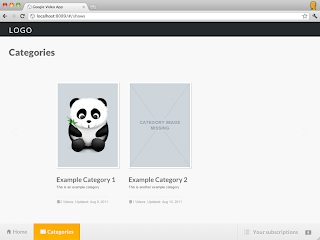Googland |
- [G] Crowdsourcing to Protect: NCMEC’s Newly Redesigned CyberTipline
- [G] Introducing Video Player Sample
- [G] Speed and Security
- [G] Collaboration “on-the-go” in Singapore with Google Apps
| [G] Crowdsourcing to Protect: NCMEC’s Newly Redesigned CyberTipline Posted: 06 Jan 2012 08:16 PM PST Google Public Policy Blog: Crowdsourcing to Protect: NCMEC's Newly Redesigned CyberTiplinePosted by Liz Eraker, Policy CounselWe are strong believers in the importance of abuse reporting tools that identify harmful and illegal content online. That's why we are proud to say we recently helped The National Center for Missing & Exploited Children (NCMEC) launch a newly redesigned CyberTipline — the national reporting mechanism for cases of child sexual exploitation — to better protect all Internet users. NCMEC receives a staggering amount of information. Since the CyberTipline's inception over a decade ago, it has handled more than 1.25 million reports of child sexual exploitation. The National Center is at the forefront of efforts to protect society's most vulnerable individuals by providing tools and resources for reporting abuse and working with law enforcement on child sexual exploitation investigations. We are proud to have assisted NCMEC in building a more user-friendly and seamless reporting system for both the public and electronic service providers. In the spirit of our continued partnership with NCMEC, we hope that these improvements will help to better facilitate CyberTipline reporting and encourage more Internet users to join the fight against child sexual exploitation. More details about the new CyberTipline are available on the NCMEC website here. URL: http://googlepublicpolicy.blogspot.com/2012/01/crowdsourcing-to-protect-ncmecs-newly.html |
| [G] Introducing Video Player Sample Posted: 06 Jan 2012 08:16 PM PST Google Open Source Blog: Introducing Video Player SampleHave you ever wanted a fun and beautiful way to publish videos on your own site like the new 60 Minutes or RedBull.tv apps from the Chrome Web Store? I'm excited to announce the release of The Video Player Sample! The Video Player Sample is an open source video player web app built using the same architecture as the 60 Minutes and RedBull.tv apps. It can be customized, extended, or just used out of the box and populated with your own content. How it works When a user opens the Video Player Sample web app, they can choose to watch a single video or create a playlist of videos/episodes from a list that they have uploaded and populated to the app. The Video Player Sample is configured and information about the videos is stored in JSON files (config.json and data.json respectively), both of which are located in the data directory. Key features
 How it's built The Google Video Application is written for the open web platform using HTML and JavaScript, broadly following the MVC (Model View Controller) pattern and structure.
Browser Support In addition to working as an app that can be installed through the Chrome Web Store, the Video Player Web App has been tested and works in all of the modern browsers. Try it out You can see a demo of the video player in action in the demo app, or by Adding it to Chrome through the Chrome Web Store. To learn more about how the app works, check out the documentation. You can grab the code from Google Code. Enjoy! By Pete LePage, Chrome Web Store Developer Relations Team URL: http://feedproxy.google.com/~r/GoogleOpenSourceBlog/~3/zt_rD3w9vPw/introducing-video-player-sample.html |
| Posted: 06 Jan 2012 08:16 PM PST Google Chrome Blog: Speed and SecurityToday's Beta release improves on two of Chrome's core principles: speed and security.One of the things people like best about Chrome is that it loads web pages quickly. To get you where you want to go even faster, Chrome will now start loading some web pages in the background, even before you've finished typing the URL in the omnibox. If the URL auto-completes to a site you're very likely to visit, Chrome will begin to prerender the page. Prerendering reduces the time between when you hit Enter and when you see your fully-loaded web page--in some cases, the web page appears instantly. On the security front, improvements to Chrome's Safe Browsing technology should help protect you from additional types of malware attacks. Previously, Chrome focused primarily on protecting you from sites that would exploit your computer with no user interaction required. Now, we're seeing an increase in malicious websites that try to convince you to download and run a file that will harm your computer. Some websites even pretend this malicious file is a free anti-virus product. To help protect you against malicious downloads, Chrome now includes expanded functionality to analyze executable files (such as ".exe" and ".msi" files) that you download. If a file you download is known to be bad, or is hosted on a website that hosts a relatively high percentage of malicious downloads, Chrome will warn you that the file appears to be malicious and that you should discard it. We're starting small with this initial Beta release, but we'll be ramping up coverage for more and more malicious files in the coming months. Remember, no technical mechanism can ever protect you completely from malicious downloads. You should always be careful about which files you download and consider the reputation of their source. Try out these changes in the new Chrome Beta--we look forward to hearing your feedback. As always, please keep in mind that the Beta channel inherently comes with more bugs and kinks to work out. Posted by Dominic Hamon, Software Engineer and Speed Demon URL: http://chrome.blogspot.com/2012/01/speed-and-security.html |
| [G] Collaboration “on-the-go” in Singapore with Google Apps Posted: 06 Jan 2012 07:24 AM PST Official Google Enterprise Blog: Collaboration "on-the-go" in Singapore with Google AppsPosted by Patrick Liew, CEO, HSREditors note: Today's guest blogger is Patrick Liew, CEO of HSR Property Group, the leading real estate company in Singapore, with more than 2,000 agents. See what other organizations that have gone Google have to say. Any large real estate company like HSR has to respond quickly to customer requests and market changes to stay competitive. Our agents are constantly out of their offices and showing properties. Their main access to email is via their tablets and smartphones. This isn't really surprising, since smartphone use in Singapore is more than three times the global average.  Because mobility is so critical in our industry, it was important for us to find a solution that enabled access from any device. Our old email system also caused a lot of storage and performance bottlenecks. We wanted quicker, simpler access and easier ways to collaborate with each other and our clients. Google Apps was a good fit for our IT priorities and our business. From an IT-management perspective, Google Apps was intuitive for our users, scalable, and easy to manage. Google Apps has helped HSR improve information flow and collaboration, leading to better engagement with our agents. We now use Google Sites to create intranets that provide our widely scattered agents with information on pipelines, co-broker opportunities, and training. Dashboards on these sites help us gauge each team's performance. Google Sites also allows us to share floor plans, maps, pricing, availability, and other real estate data, both internally and with clients. Google Docs serves as a company memo and lets colleagues update each other quickly on events, listings, and other important information. We track training sessions with Google Calendar, and share training content and attendance records with Google Docs. We love Google Apps' security features and cloud-based delivery, too. If an agent loses a phone in the morning, the data can be wiped remotely, and then—since contact information and other data are stored in the cloud—the agent can be up and running on another phone by noon. New government regulations also require real estate agents in Singapore to retain originals or copies of certain documents for at least three years. Google Apps provides simple archiving, and we now handle data retention through Google Postini. Everyone at HSR is synchronized these days with Google Apps. We run our entire business using it, from selling to after-sales service. There's no doubt—collaboration has never been made easier. URL: http://googleenterprise.blogspot.com/2012/01/collaboration-on-go-in-singapore-with.html |
| You are subscribed to email updates from Googland To stop receiving these emails, you may unsubscribe now. | Email delivery powered by Google |
| Google Inc., 20 West Kinzie, Chicago IL USA 60610 | |
No comments:
Post a Comment